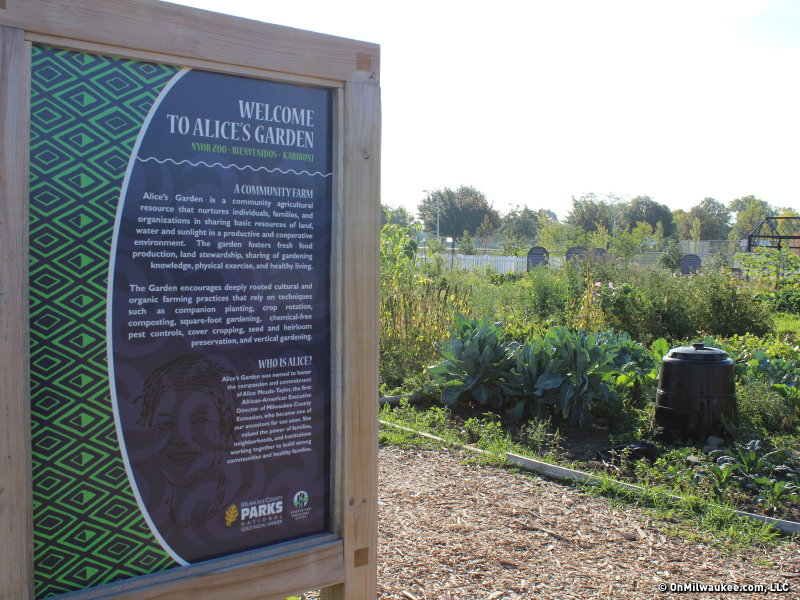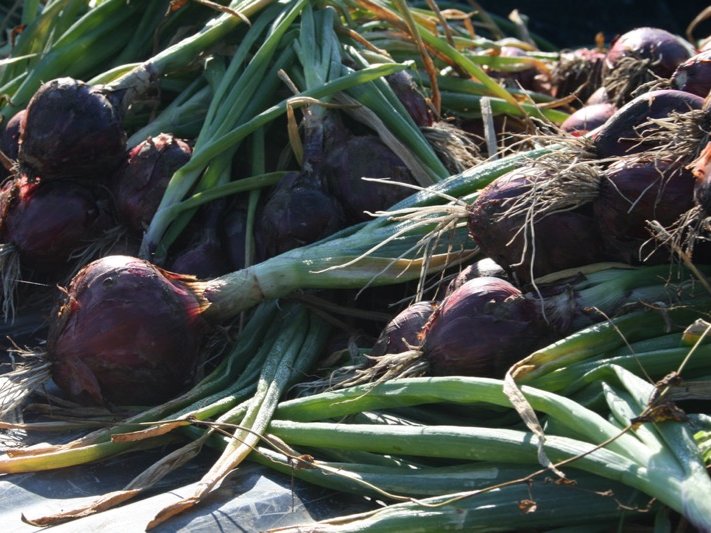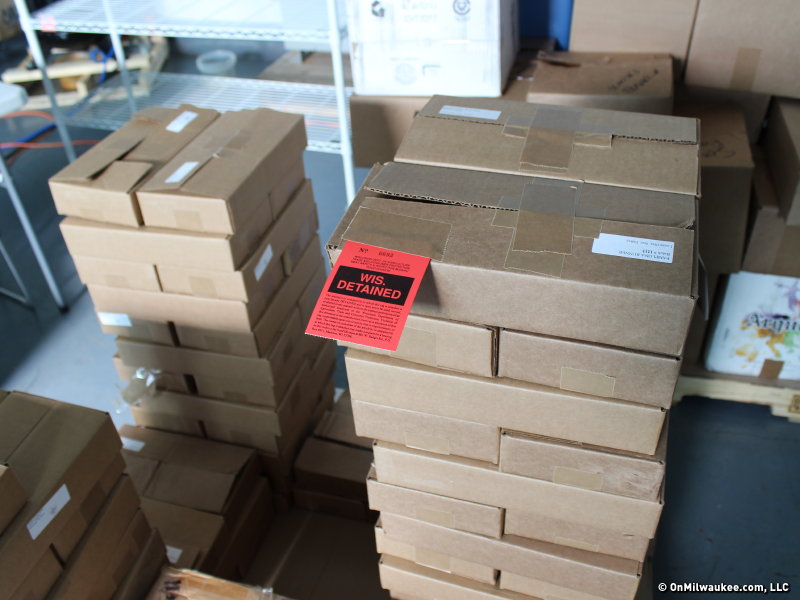For the seventh straight year, October is Dining Month on OnMilwaukee.com, presented by the restaurants of Potawatomi. All month, we're stuffed with restaurant reviews, delectable features, chef profiles and unique articles on everything food, as well as the winners of our "Best of Dining 2013."
Since 2008, Alice’s Garden has provided locally grown herbs and herbal teas to the Milwaukee community, along with education and informational workshops. Beginning in 2014, they will also begin offering an Herbal CSA (community supported agriculture) program.
"The most important thing about this program is re-introducing herbs more fully to the community," says Alice’s Garden Director Venice Williams. "The healing properties, the beauty, and what it means to reclaim some ancient traditions and wisdom that we’ve lost."
Williams, who has become known as the "Herb Lady" in many circles, grew up around gardens and fresh food. While getting underfoot in her grandmother Nellie’s kitchen, she witnessed the transformation of the vegetables and herbs her grandfather Henry grew into delicious dishes that nourished their large family.
"I worked in the gardens with my grandmothers," she says. "But, I learned from my mother about the healing property of the garden. When my mother left the chaos of our household and stepped into the garden, she became a different person. She came back a different person. And I witnessed that."
Seeing the peace that gardening brought to her mother, Williams’ perspective was transformed.
"Herbs were an interest that I got hooked on," she tells me. "They became a way to remember family stories. I would see things and remember things. For instance, my great-grandmother used lovage in her big pot of beans, which of course always had some smoked meat in it … and in her soups."
Many Milwaukeeans probably haven’t even heard of lovage, the tall perennial with staunch hollow stems and leaves with a flavor and fragrance reminiscent of celery. But, Williams hopes to change that.
"This season is the first time that I have had a full presence at farmer’s markets with herbs," she explains. "And the response has been totally overwhelming. People are intrigued … and surprised. They are embracing it."
She points to the overwhelming demand for chamomile that she found among the Mexican women who visit the Westown Farmer’s Market.
"I saw grown women cry because it was grown by their grandmothers," she says. "They told me the stories about how their grandmothers would use it. It was our largest seller there."
A teacher by nature, Williams hope is that she can pass along that deep appreciation for herbs and the ways they can be used to nourish and heal, to customers of the CSA.
But, how does an herbal CSA program work?
When consumers sign up for a traditional CSA program, they purchase a "share" which entitles them to a box or basket of fresh produce on a weekly or bi-weekly basis. In the case of Alice’s Garden’s Herbal CSA, the fresh produce is in the form of herbs provided every other week throughout the growing season which takes place June through October.
Each basket will contain fresh culinary herbs, information on the history of each herb, and recipes for both medicinal and culinary uses including teas, tinctures and other preparations. Herbal flower bouquets, and hand-made herbal products, including lip balm, scrubs, hair and body oils and bath salts will also be included with each delivery.
Interested consumers can buy into the program in two ways. A half-share provides twelve baskets which will contain three to five herbs and one herbal product for $125. A whole share will include twelve baskets filled with seven to ten fresh herbs and two herbal products for $250. A deposit of $50 for a half share and $75 for a whole share is due at the time of sign-up.
Share-holders have the choice of a variety of sites, at which they’ll pick up their deliveries. Sites include Tuesday evenings at Alice’s Garden, Wednesdays at the Westown Farmers Market, or Saturday mornings at the Fondy Farmers Market. For more information or to request a brochure about the CSA program, visit alicesgardenmilwaukee.com.
More about Alice’s Garden
"The biggest gift of coming into this space was the wealth of stories that have come to me," Williams reflects, as she tells me the history of Alice's Garden. And, by the time she finished her tales, I found myself astounded by the power of the message the garden holds.
The acreage on which Alice’s garden sits was once part of abolitionist Deacon Samuel Brown’s farm. In 1842, Deacon Brown, who also happened to be one of the founding fathers of Milwaukee, provided safe passage to Caroline Quarlls, the first documented runaway slave seeking refuge in Wisconsin. The 16-year-old escaped from a plantation in St. Louis where she was enslaved. By and by, events at Brown’s farm led historically to the birth of the Underground Railroad in Wisconsin. Letters Quarlls wrote to Lyman Goodnow, a man who escorted her from Milwaukee to Waukesha, are preserved at the Civil War Museum in Kenosha.
The land, which was later developed, became the home of a strong, vibrant African-American community, which thrived until being dismantled in the late 1960s by a plan for a "system of express highways" scheduled to be built in the area. Thousands of houses and businesses were demolished before the project was brought to a halt in 1972 by Mayor Henry Maier.
The land, now cleared, made way for a community garden, originally run by Milwaukee County.
Named for Alice Meade Taylor, past executive director of Milwaukee County Extension, the land on which Alice’s Garden stands was originally run by the Milwaukee County Cooperative Extension. Land was rented to community members, including African-American and Hmong gardeners and farmers, as part of a community gardening project.
In 2006, at the invitation of Milwaukee Cooperative Extensions department of 4-H and Youth Development, SeedFolks Youth Ministry, under the leadership of Venice Williams, was invited into the garden to develop the urban agricultural programming at Alice's Garden. SeedFolks brought to the garden programs such as the Garden Mosaics Earn & Learn Program, SeedFolks Reading Circles, Reclaiming and Nourishing Family Traditions, and Brown Boys Bonding Thru Books.
Fieldhands and Foodways, an agricultural, historical and cultural-based learning opportunity, was created, in part, to honor the historical setting of Alice’s Garden and the surrounding area.
This year, the garden rented plots to 113 tenants comprised of both family and community organizations eager to cultivate organic produce, and an additional 30 remained on a waiting list. Under Williams’ leadership, the garden achieved not-for-profit status in the state of Wisconsin in 2012, and is currently seeking federal 501(c) 3 status. Williams says that 2014 will be a banner year for the organization as it solidifies its infrastructure and expands its programming.
The fact is, Alice’s Garden is more than just a place for growing food: It has become a successful urban resilience initiative which fosters candid public conversations about food justice, racial equality and culture. From town hall meetings to film discussions to events like Full Moon Full Woman, a celebration of Native American culture and tradition, the garden has become a place that brings people together.
"We have gardeners from all over the city. We even have one woman who comes in from Waukegan, Ill." Williams tells me. "She told me ‘I don’t come here to grow food. I come here for everything else that goes on here.’ And that really says it all. It’s about bringing people together who would never ever, ever ordinarily get together."
As a passionate champion of the local dining scene, Lori has reimagined the restaurant critic's role into that of a trusted dining concierge, guiding food lovers to delightful culinary discoveries and memorable experiences.
Lori is an avid cook whose accrual of condiments and spices is rivaled only by her cookbook collection. Her passion for the culinary industry was birthed while balancing A&W root beer mugs as a teenage carhop, fed by insatiable curiosity and fueled by the people whose stories entwine with every dish. Lori is the author of two books: the "Wisconsin Field to Fork" cookbook and "Milwaukee Food". Her work has garnered journalism awards from entities including the Milwaukee Press Club. In 2024, Lori was honored with a "Top 20 Women in Hospitality to Watch" award by the Wisconsin Restaurant Association.
When she’s not eating, photographing food, writing or planning for TV and radio spots, you’ll find Lori seeking out adventures with her husband Paul, traveling, cooking, reading, learning, snuggling with her cats and looking for ways to make a difference.







